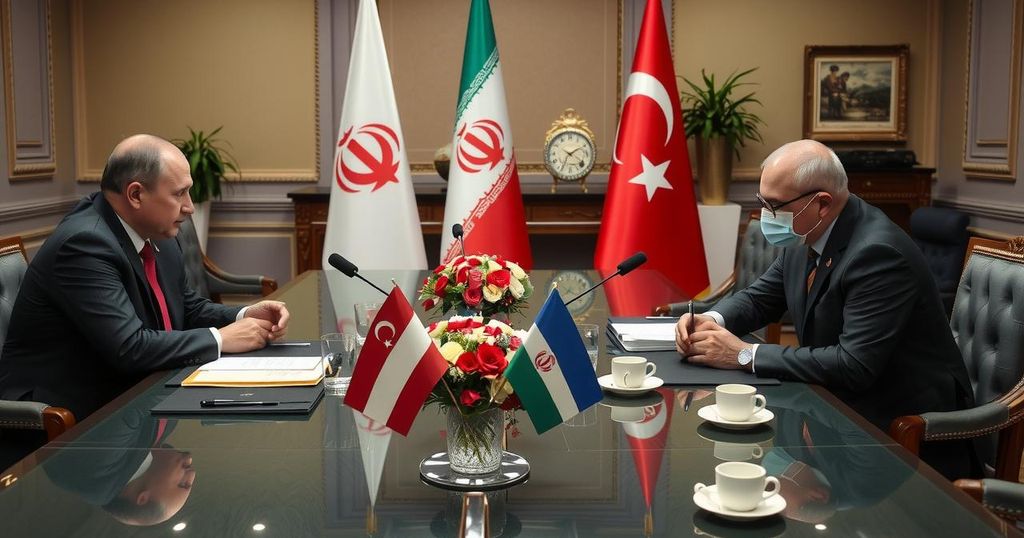Turkey, Russia, and Iran to Discuss Syrian Conflict Amidst Rebel Advances

Turkey, Iran, and Russia will meet in Qatar this weekend to discuss responses to a recent rebel advance changing the course of the Syrian civil war. The discussions occur during the Doha Forum, emphasizing the Astana process initiated in 2017 to foster a political resolution. Islamist militants have recently captured Aleppo, escalating regional tensions and prompting varied outlooks from the global community on political prospects regarding the Syrian conflict.
This weekend in Qatar, Turkey, Iran, and Russia will convene to address the recent advancements made by rebel forces that have altered the dynamics of the Syrian conflict. This meeting occurs during the Doha Forum, a renowned event that gathers global leaders across various sectors. Turkey’s Foreign Minister, Hakan Fidan, is set to meet with his counterparts from Russia and Iran in an effort to advance peace negotiations through the Astana process, initiated in 2017 to achieve a political resolution in Syria.
The backdrop to this high-stakes meeting involves a significant shift on the battlefield: Islamist militants from Hayat Tahrir al-Sham (HTS) recently secured control of Aleppo, Syria’s second-largest city, and have made advances towards Hama. Historically, Hama has remained under government control since the civil war erupted in 2011. Russian President Vladimir Putin and Turkish President Recep Tayyip Erdogan have discussed the necessity of addressing this aggression towards the Syrian state, as Erdogan emphasizes the importance of engaging in political dialogue concerning the conflict.
Turkey has supported various rebel forces in the region, as evidenced by its backing of the Syrian National Army, opposing the U.S.-supported Syrian Democratic Forces (SDF), which have allied with Kurdish factions. The conflict has re-escalated with clashes erupting among these groups following HTS’s offensive. Meanwhile, Russia, initially a decisive force in favor of President Bashar al-Assad’s regime, currently faces distractions due to its ongoing military efforts in Ukraine, while Iran grapples with challenges posed by a regional conflict with Israel.
Experts express mixed opinions regarding the potential impact of the recent HTS advances. Some speculate it may pressure Assad and his supporters to consider compromises; however, others believe that both Russia and Iran continue to support his regime despite the challenges they face. Retired General Joseph Votel emphasized that neither Russia nor Iran desire to relinquish their strategic foothold in the region, which includes vital military bases and political leverage.
Turkey’s stance remains focused on preventing the rise of a Kurdish entity in Syria, associated with the PKK, which Turkey labels a terrorist organization. The influx of Syrian refugees into Turkey remains a crucial concern for Ankara, as it seeks viable conditions for their potential repatriation to Syria. A rapid ceasefire could benefit this goal, facilitating safe returns for refugees exhausted by the prolonged conflict.
Meanwhile, U.S. military involvement continues in Syria, with approximately 900 personnel supporting the SDF against ISIS. The U.S. government has voiced concerns regarding the Assad regime’s intransigence towards initiating a political resolution, citing the continued threat of ISIS’s resurgence amidst the evolving conflict. Secretary of State Antony Blinken underscored the importance of preventing the revival of ISIS’s jihadist ambitions.
The Syrian civil war, igniting in 2011, has undergone various shifts in alliances and power dynamics. The Astana process, initiated in 2017 by Russia, Iran, and Turkey, aims to establish a political settlement to the ongoing conflict, which has led to significant humanitarian crises and displacement. The role of external powers and their vested interests has been pivotal in shaping the conflict’s trajectory, as evidenced by recent aggressive maneuvers by rebel groups. As Turkey assesses the risks posed by Kurdish groups, Russia and Iran focus on consolidating their influence over Assad’s regime while addressing regional security concerns amid their respective challenges.
The upcoming talks among Turkey, Russia, and Iran during the Doha Forum represent an important step in addressing the escalated situation in Syria, particularly with HTS’s recent territorial gains. The complex web of alliances and conflicts highlights ongoing challenges in achieving a sustainable political resolution. The futures of both Syrian internal factions and their international allies remain intertwined, with divergent interests influencing potential outcomes in the region. Further developments in the humanitarian situation, especially concerning refugees and the resurgence of ISIS, warrant close monitoring as influences of both regional dynamics and global powers continue to play out.
Original Source: www.voanews.com






